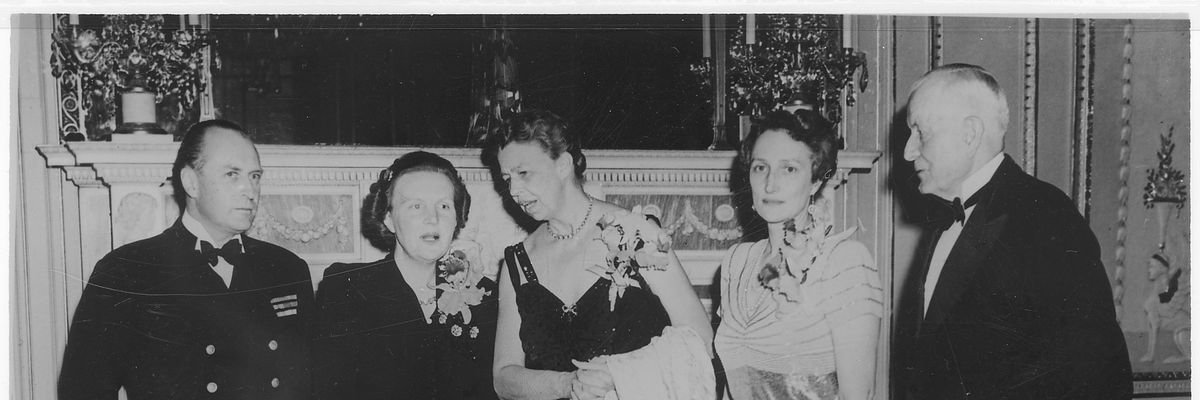Am I alone in finding the American romance with European kings and queens, princes and princesses more than slightly odd? For reasons that I find inexplicable, many of our fellow citizens can’t seem to get enough of royalty, whether in film, print, or televised interviews such as Oprah’s latest triumph featuring the Duke and Duchess of Sussex, known to an adoring public as Harry and Meghan.
The newest offering on the celebrated PBS series Masterpiece offers yet another example of this phenomenon, this one centered on the travails of Norway’s royal family during World War II. The eight episodes of Atlantic Crossing invite viewers to consider the “based on actual events” possibility that a close friendship between Crown Princess Martha of Norway and President Franklin Delano Roosevelt, a.k.a., the Squire of Hyde Park, made a vital contribution to the eventual Allied victory over Germany in World War II.
I confess to having made it only through Episode 1. With little princelings in tow, Martha flees Norway when the Nazis invade in 1940. Assisted by a retinue of loyal servants (who abandon their own children), she makes a daring escape into Sweden, land of her birth. Although further adventures will follow on successive Sunday evenings, I am already calling it quits. In future episodes, Martha will sail for America to take up residence in the White House as FDR’s personal guest and, if we are to believe the promotional materials prepared for the series, trusted counsellor.
So move over Harry Hopkins, George Marshall, Dwight D. Eisenhower, George Patton, and Douglas MacArthur. For God’s sake, move over Winston Churchill! Make room in America’s pantheon of wartime heroes for an attractive princess-in-exile to whom FDR ostensibly took a fancy.
Norwegians apparently revere the real-life Princess Martha as a genuine patriot. Were I ethnically Norwegian, perhaps I would share such sentiments. As it is, her life and her life story, however commendable, resonate with me about as much as does the televised saga of Queen Victoria and her several generations of Windsor offspring down to the aforementioned Harry. That is to say: not much.
I’ve had it with packaging history in sentimental wrapping paper, especially when the effect is to inhibit a realistic understanding of the past. And nowhere does the sentimentalization of the past have a more deleterious effect than with regard to World War II. On that score, Atlantic Crossing offers an all too common, if notably corny example.
Three-fourths of a century after it ended, the war against Nazi Germany remains the wellspring of American Exceptionalism—the primary source of the illusion that having once rescued the world from evil, the United States is called upon to do it again and again.
That Hitler’s Thousand Year Reich epitomized evil is doubtless the case. Its destruction a mere 12 years after its creation stands out as a rare bright spot in an otherwise pretty abysmal century.
But dig deeper and things soon become complicated. The goodness of the Good War turns out to be no more than skin deep. A shared antipathy for the Hitler regime bound the Allies to one another—not a common devotion to freedom, democracy, the dignity of every human person, or any of the other ideals that Americans profess to cherish. Values figured as an afterthought.
Franklin Roosevelt was a remarkably effective commander-in-chief, who overcame challenges more daunting than any president apart from Lincoln has ever faced. To appreciate his singular brilliance as a wartime leader, we need only consider the performance of recent U.S. presidents, vainly struggling merely to close down—forget about actually winning—comparatively minor conflicts.
Yet FDR’s effectiveness in steering the United States through World War II to a position of global primacy did not stem from his susceptibility to the charms of visiting princesses. Like his principal collaborators Churchill and Josef Stalin, Roosevelt had a knack for distinguishing between what really mattered (keeping Great Britain in the war) and what was peripheral (the fate of Norway). Therefore, he knew how to prioritize. Although the U.S. president could join the British prime minister in making Onward-Christian-Soldiers gestures of solidarity, his actual outlook was closer to Stalin’s: shrewd, ruthless, and relentlessly focused on strategic purpose. Again, a comparison with recent U.S. presidents, who confuse strategic purpose with cliché-filled speeches, is instructive.
President Roosevelt possessed considerable charm, which he could deploy as the occasion required. Yet beneath that pose of cheery effervescence, he was as cold and calculating as they come. His friendships were strictly utilitarian, as more than a few associates—including Churchill—discovered once FDR deemed their usefulness to be on the wane. As president, Roosevelt had time for royals to the extent that they were in a position to advance U.S. strategic interests and no further. It seems far to say that he was more interested in courting King Ibn Saud of oil-rich Saudi Arabia than the crown princess of Norway, its substantial oil reserves as yet undiscovered.
Cheesy programs like Atlantic Crossing diminish the protagonists they purport to celebrate. In doing so, they falsify history and thereby obscure the actually existing problems of the present, which bear no comparison whatsoever to those that Roosevelt dealt with.
Let me suggest the following to the producers at Masterpiece: Declare a ten-year moratorium on dramas inspired by World War II. In the interim, commission a series about George W. Bush and his henchmen scheming after 9/11 to invade Iraq. And once that airs, let’s have another series recounting efforts by Bush and Barack Obama and Donald Trump and now Joe Biden to shut down America’s two decade-long war in Afghanistan. Surely, the result would be more instructive than yet another costume drama that misrepresents events that it purports to depict.
This article was republished with permission from The American Conservative.
















